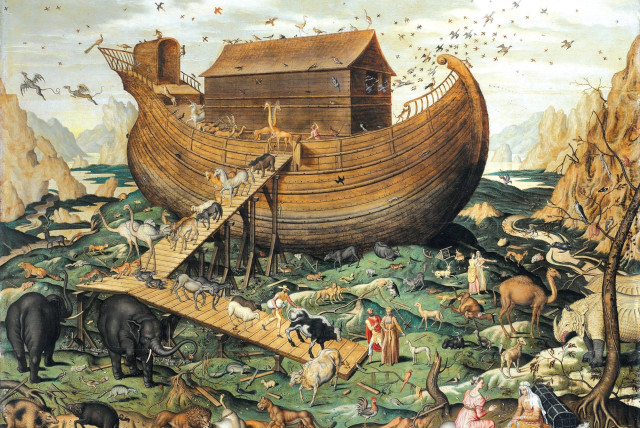Noah: The Bible's most underrated, unappreciated hero - opinion

From now on when we read “for it is you that I have seen righteous before me in this generation” (7:1) take a minute to be in awe of Noah, the Torah’s most underrated transformational hero.
Noah is one of the least appreciated and one of the most underrated heroes in the Torah.
We know that he was chosen to be the progenitor of all of mankind 10 generations after Adam and Eve. But why? What is it about Noah that the Lord found so favorable? “For it is you whom I have seen to be righteous before Me in this generation” (Genesis 7:1).
The Torah narrative does not generally include all the details of any story. In fact, the “white space” between letters, words, lines, and sections of the Torah occupy more space than does the black ink of the 304,805 letters. And it is within that white space that we are encouraged to discover multifaceted text-anchored narratives that can, at times, be at least as enlightening as the letters themselves.
So what do we, in fact, know from the Torah text about Noah that could enrich our comprehension of the Lord’s choice of Noah as the progenitor of all future mankind?
Noah, we are told (5:32), has children at the age of 500, and each child is named.
For 19 generations, from Adam to Terah, people produced many children, but only the first born has a name. All the others are anonymous (“and he birthed sons and daughters”).
Noah is the first parent who declares that every child is an individual, that every child has a name. Noah declares that the human mission is not to produce one heir and many other insignificant progeny, but rather that the human mission is to empower every child, and provide for them the best possible living conditions in which to prosper.
Human existence is not simply about the here and now, and of clan building, which was the norm at that point in human development. Human existence is to see each child as an individual creation, and to build the best possible future for all of mankind.
But this is only part of the uniqueness of the Bible’s greatest transformational hero.
Noah: The Bible's greatest transformational hero
NOAH WAS born into a cruel and evil world – a world filled with chamas (6:11), a world governed by “cursed is the soil” (3:17). In a cursed-soil earth paradigm, man is not able to generate enough produce to feed the world comfortably. Crime is inevitable. All of human existence becomes corrupt. And instead of striving to free the soil of its curse pre-Noah, humanity perpetuated and magnified the inequities.
It is Noah – “Noah was a righteous man; pure was he in his generations” (6:9) – who stands up and declares that he will not bring children into such a corrupt world. He and his wife will not have children until he is 500 years old. The previous record holder for being the oldest father had been Noah’s grandfather Metushelach, at age 187. I contend that this wildly outlier statistic of becoming a parent at 500 years old is existentially significant.
Only at the age of 500 does Noah agree to become the transformational agent for all of humanity. But that is only on condition that the Lord will transform the “adama,” the earth, from cursed to generative. And, indeed, the Torah reports (8:21) that the Lord said to His heart: “I will no longer continue to curse the earth.”
It is Noah’s steadfastness to not bring children into an evil and corrupt world, and his imploring the Lord for 400+ years to change the soil from cursed to generative, that gains for him the moniker of “ish ha’adama” (9:20). And that may not reflect the full range of Noah’s multifaceted 400+ year campaign. Because after the flood we read of The Lord’s commitment to seasonal predictability. “There will be planting seasons and sowing seasons; cold periods and warm periods; summer and winter and all these will be as predictable as day and night” (8:21).
And all of these cosmic changes are the result of one man’s 400+ year tenacious campaign for changing the conditions of human existence.
Is it any wonder that Noah is the only biblical character of whom it is said that he found favor in the eyes of the Lord (6:8)?
It is this unique human being who promotes the equal individualism of every child. It is this same unique individual who negotiates with the Lord for a productive, rather than a cursed, earth. It is this individual who, on behalf of a better world, generates an eternal commitment from the Lord for consistent and predictable seasonal weather patterns.
And it is this unique Noah who maintains family togetherness and fidelity even within the animal kingdom (8:18-19) in an era where all else was most evil and corrupt.
From now on when we read “for it is you that I have seen righteous before me in this generation” (7:1) take a minute to be in awe of Noah, the Torah’s most underrated transformational hero.
The writer, a veteran educator with a long history in leadership development in Israel and Europe, has recruited and counseled youth from North America with Naaleh. With rabbinic ordination from Yeshiva University, he has taught Torah to people of all ages and is currently also learning with and teaching the Ugandan Abayudaya Jewish communities and various Christian Torah learners. abreichman@gmail.com
Jerusalem Post Store
`; document.getElementById("linkPremium").innerHTML = cont; var divWithLink = document.getElementById("premium-link"); if (divWithLink !== null && divWithLink !== 'undefined') { divWithLink.style.border = "solid 1px #cb0f3e"; divWithLink.style.textAlign = "center"; divWithLink.style.marginBottom = "15px"; divWithLink.style.marginTop = "15px"; divWithLink.style.width = "100%"; divWithLink.style.backgroundColor = "#122952"; divWithLink.style.color = "#ffffff"; divWithLink.style.lineHeight = "1.5"; } } (function (v, i) { });

